Seven new faces, seven new stories
Seven new faces, seven new stories McGill University
User Tools (skip):
Seven new faces, seven new stories
Every year for the past eight years, as part of its ongoing program of academic renewal, McGill has hired some 100 new professors. Coming from around the world and down the street, these new McGillians boast a diverse range of expertise but share at least one common trait: they are leaders in their respective fields. From ethics to green chemistry to opera to electrical engineering, the following seven professors are just a small sample of all the newcomers to McGill who are doing their part to improve both our university and our world.
MEHMET GUMUS
Engineering better businesses
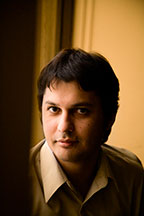
Claudio Calligaris
One look out the window these days and it's impossible to believe that anyone would trade sunny California for Montreal and its decidedly less pleasant weather.
"I didn't actually think about coming here," says Mehmet Gumus, who has been an assistant professor at the Desautels Faculty of Management since September. "But after a couple of campus visits, I really liked it."
Originally from Turkey, Gumus completed his first Engineering degree in Istanbul before moving on to the University of California, Berkeley, to tackle a Masters and a recently-completed PhD in Industrial Engineering. Gumus began hunting for the right job in the right place.
"Montreal was the best city I saw during my interviews," he says of the locale that beat out a number of others, from Texas to Waterloo. "It's a tough choice, you take all the trade-offs, and you make your decision." Married with a young child, he was drawn to a "big town" that offered "lot of opportunities for my wife and family."
The city mattered, naturally, but so did the university, the faculty and, more particularly, the department, his expertise being Operations Management, which analyzes what Gumus calls the “transformation processes” of goods and services - from their conception and development to their distribution – and aims to make them more efficient. Gumus is impressed with the number of young professors like him, and also feels advantages flow from his group’s size. “It’s a small department, so there are a lot of collaboration opportunities for me,” he says. “I think it’s a great place for me to build my career.”
It may seem odd that an engineer by training would opt to teach budding business minds, but Gumus explains: "The engineering department I came from is not only industrial engineering—it has an operations research element. Basically, the area of operations management is application-oriented, but the tools that we are using here come from the operational research part of the engineering world."
It's been five months," he continues, sounding both astonished and enthusiastic, "and I've started a lot of projects with my colleagues here." Gumus will only begin teaching next semester, but already has some idea of what's in store. "As I've heard from my friends here, they are the top students in Canada," he says. "I'm expecting a challenge in the classroom."
—Pascal Zamprelli
VALÉRIE ORSAT
Aider les jeunes à changer le monde
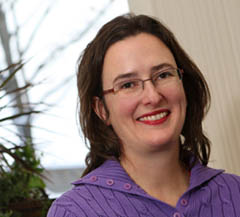
Owen Egan
Avec en poche un bac en génie agricole, une maîtrise et un doctorat en génie alimentaire ainsi qu’un impressionnant carnet de route en gestion de projet de développement international en Chine et en Inde, Valérie Orsat entamait sa nouvelle carrière de professeure en juin dernier. Depuis septembre, cette triple diplômée de McGill dispense un cours sur les propriétés des matériaux aux étudiants de génie des ressources biologiques à la faculté d’agriculture du campus Macdonald.
«Par mon travail de professeure, je veux contribuer à l’effort de la prochaine génération, explique Valérie Orsat. Je veux préparer les étudiants à relever des défis et leur donner des outils pour réussir à accomplir leurs projets. Je veux les aider à réaliser leurs rêves.»
Et des rêves, les 18-20 ans en ont à revendre, selon la professeure. «Ils veulent tous changer le monde et sauver la planète, soutient-elle. Ils veulent tous voyager, s’en aller ailleurs et faire bouger les choses. Ils se sentent très interpellés par les questions environnementales actuelles.»
L’expérience internationale en développement alimentaire de Valérie Orsat réussit à captiver son auditoire étudiant. Elle permet de transmettre ses acquis en les appuyant sur des exemples sur le terrain très réels. En Chine, la professeure a participé à des projets axés sur la transformation alimentaire avec les étudiants de l’Université de Nankay dans la ville de Tianjin, au sud-est de Pékin.
«En Inde, le projet était à un niveau plus rural, poursuit-elle. Il s’agissait d’aide à la récolte et de transformation simple.» Dans l’État du Karnataka où elle se trouvait, les périodes de récoltes intensives sont généralement suivies de disettes importantes. «Nous les aidions à développer des méthodes de séchage, d’entreposage des excédents de récolte pour répondre aux besoins en temps de pénurie. » En fait, il s’agissait de projets de sécurité alimentaire pour assurer la survie des villages.
Le travail qui a amené Valérie Orsat à fouler les sols chinois et indien a transformé sa façon d’envisager vie et métier. «Outre l’ouverture sur le monde, on revient avec plus d’humilité. On apprend à redéfinir nos priorités», affirme-t-elle. «L’expérience nous ramène à la simplification de ce que l’on fait. Ici, la recherche se fait au niveau ‘nano’, loin des gens. La modélisation des chercheurs dans notre domaine donne des résultats très complexes, alors que là-bas il faut développer des solutions et de l’équipement simples, peu coûteux, faciles à produire.»
C’est avec cette simplicité renouvelée que Valérie Orsat aborde ses nouveaux étudiants. Elle comprend leur désir de se retrouver ailleurs, dans des contrées où le métier d’ingénieur agroalimentaire a conservé ses lettres de noblesse. «Ce métier est très peu valorisé ici. C’est ailleurs qu’ils trouvent la valorisation de leur métier. C’est ce que ma génération aussi a fait en travaillant à des projets internationaux.»
Cette mère de trois enfants est ravie de se trouver en permanence près des siens dans un rôle d’enseignante où elle a l’occasion de transmettre ses connaissances et poursuivre ses apprentissages. «J’apprends autant que mes étudiants en enseignant, je travaille avec eux. Nous avons un cheminement commun.»
—Céline Poissant
VICTOR MUÑIZ-FRATICELLI
Blending law and politics
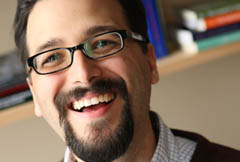
Owen Egan
Some professors just seem as though they are meant to be at McGill. But what if they're born far away—say, Puerto Rico? Well, in some cases destiny steps in, and then it's just a matter of time.
Following a stint studying Government and Philosophy at Cornell, Victor Muñiz-Fraticelli returned home for Law School at the University of Puerto Rico, then clerked a few years at the Supreme Court of Puerto Rico. Already, he began encountering legal concepts that would later point him northward. Looking back, he says studying Puerto Rican law "was part of what drew me to McGill, because the Puerto Rican legal system is very similar to Quebec's in terms of the mix between common law and civil law."
He moved to the University of Chicago to complete a Masters and a PhD in political theory. Before long, McGill would be back on his mind, as one of his professors, Jacob Levy, announced he would be off to Montreal to become Tomlinson Professor of Political Theory. Levy was in fact Chair of Muñiz-Fraticelli's dissertation committee and oversaw much of his research, which focused on connecting political philosophy and law. "Because of my training in law and politics, I look at political theory as an institutional endeavor," he says. "I like to look at how institutions shape the practice of our philosophical inclinations, and what better place to look for that that than law?"
Muñiz-Fraticelli began pondering his own next move, wondering how to continue pursuing both of his passions. McGill beckoned again, this time in the form of the perfect job: a new cross appointment between the department of Political Science and the Faculty of Law. “So when this new position on law and politics opened up,” he says, “it was a natural fit – it helped me not to have to give up either the legal discipline or the political theory side of things.”
He speaks glowingly of the Faculty of Law's "almost programmatic commitment" to his area of expertise, pluralism: "studying law from different perspectives, from different disciplines, not only from the lawyer's point of view, but also bringing in the philosopher's point of view, the political scientist's point of view. You have other theoretically inclined faculties like NYU, Columbia, or Harvard," he adds, "but I think that the focus on pluralism here at McGill is special."
Deans Chris Manfredi (Arts) and Nicholas Kasirer (Law) have in fact made it a priority to develop some more formal interdisciplinary links. Muñiz-Fraticelli, assistant professor of law and politics since September, was as ideal a fit for the job as it was perfect for a theorist such as himself. “The political science department has a long and very prestigious history in political theory. On the other side of Dr. Penfield, not only is the McGill law faculty one of the most prestigious in the world, but its also a decidedly theoretical faculty.”
Eventually, he confirms what is increasingly apparent: “It was almost as if the position that was created in law and politics was a position for my dissertation.”
—Pascal Zamprelli
SAM MUSALLAM
On the cyber-frontiers of medicine
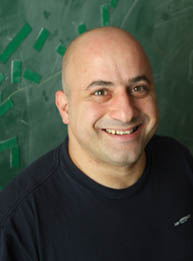
Owen Egan
As Director of McGill's Neural Prosthetics Laboratory, Sam Musallam works in the esoteric, cutting-edge field of mind/computer interfaces and robotic prosthetic limbs. His eventual goal? Nothing less than the Bionic Woman dream of creating thought-controlled, cybernetic limbs for paraplegics and amputees.
Musallam joined McGill in December 2006 as Assistant Professor in the Department of Electrical and Computer Engineering and an Associate Member of the Department of Physiology at the Faculty of Medicine, two fields which in the past have been separated by miles of cross-disciplinary no-man's-land. A graduate of the University of Toronto with an undergraduate degree in physics and a PhD in neuroscience, he later spent time at the famous Anderson Lab at the California Institute of Technology as a post-doctoral fellow, where he began his research into mind/computer interfaces.
"This was a great field to apply the physics, the engineering, all the knowledge that I'd gained," he says. "It was a great way to apply, or at least think about applications of the findings in neuroscience of visually guided behaviours, and to apply them to the clinic."
Visually guided behaviour, according to Musallam, is the complex series of neurological processes which take place in your brain every time you decide to reach for something.
"Once you decide to pick up a pen from your desk, for example, a whole cascade of brain operations go off which generate a motor plan which instructs your hand and arm exactly where and how to move. And all this all happens in milliseconds, it's not available to conscious perception."
Musallam and his team are currently studying how these operations are encoded in the parietal and pre-motor cortexes, the higher-order cognitive areas of the brain that actually calculate how you're going to reach for something, and also form the actual intention to reach.
“In paralyzed patients, with, say, a spinal cord lesion or peripheral nerve damage, we think they can still form the intention to reach, but they can't actually go ahead and do so. My work is trying to understand the signals in the brain that form the intentions and writing algorithms to drive robots to respond to these intentions."
Musallam and his team of graduate students are working on every angle of the problem, from neuroscience to the development of algorithms and software that mimic human nerve impulses to the design of the actual robotic limbs themselves.
"I'm interested in the global picture because that's what's necessary to realize a complete system," he says.
—Mark Shainblum
AUDREY MOORES
Blazing a green trail
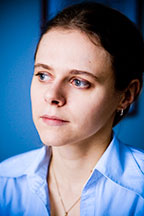
Claudio Calligaris
Audrey Moores always knew that she wanted to be a chemist. As a 13-year-old in her native France, she witnessed the classic rotten-egg smelling hydrogen sulfide science experiment and was hooked. “I was fascinated. I wanted to put things together and see them react. I was the only one who would agree to hold the tube,” says Moores. “Chemistry was the perfect balance of being able to do something with my hands and at the same time work it out in my head.”
Sixteen years later, she’s teaching green chemistry as a Canada Research Chair at McGill while working with a renowned team at the forefront of the emerging field. After completing her PhD in coordination chemistry at l’Ecole Polytechnique in Palaiseau, France, Moores was finishing up her post-doctorate in catalysis at Yale University when the opportunity to teach green chemistry at McGill presented itself.
It’s been 10 months since Moores, who inherited the English surname from her British father, seized that chance and though she does express some disappointment about no longer being able to spend as much time “working with her hands” in the lab, the 29-year-old professor is clearly energized at focusing much of her time “paving the pedagogical road” of green chemistry and working with her research group. “Teaching green chemistry is really challenging because a lot of the material is based on recent research. And because this class talks about all aspects of chemistry with the green look, I actually need to learn a lot if I want to do it well. What I try to do is relate it to solid chemistry and theories of chemistry, so the students can take what they know and make the relationships and connections. This is all very demanding pedagogically, but I’m there!”
Outside the classroom, the Moores Research Group in Catalysis for Green Chemistry is focused on researching the catalytic activity of metal nanoparticles with the ultimate goal of finding new reaction processes that are more efficient and more environmentally desirable. “We would like to find processes so that at the end of the day there’s a gain on the solvent costs, the waste costs and the energy input. If you’re reducing the amount of waste produced, you’re reducing the environmental footprint of your process; if you reduce the amount of energy involved, you reduce your carbon footprint of your process,” explained Moores.
Though her original plan was to return to France after her post-doc, Moores is thrilled about McGill and Montreal in general. “It was my first time in Canada when I came here for the interview. It turned out to be really fantastic. Montreal is such a rich city and I love McGill.” Now if she could only find time to get back into the lab.
—Allison Flynn
IWAO HIROSE
Ethically inclined
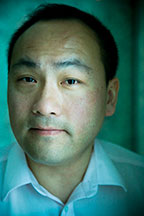
Claudio Calligaris
Sometimes it takes a fresh perspective to cast a whole new light on a national sport. “The puck is black and small,” says Professor Iwao Hirose, one of the newest additions to the Department of Philosophy. “Why don’t you use a pink or red puck?” Point taken.
Hockey insight aside, every time a new professor joins McGill, the university benefits from new perspectives as well. This is particularly true when those views are as unique as those of Hirose, who has doctorates in both economics and philosophy. “I do ethics, basically,” he explains, “more specifically, the ethical distribution of goods.”
Unafraid to tackle some of today’s most daunting challenges, the Japanese philosopher who came to McGill from Harvard University is an expert in distributive justice philosophy specializing in health care and the environment. “When I was working on my economics doctorate, my thesis was about health care resource allocation in developing countries. So, I have been interested in the welfare issues of poorer countries for a while. Now the interest in environmental issues is an extension of that.” Two of his current research projects demonstrate the role distributive justice philosophy can play in these two fields.
The first is about fairness and discrimination in the allocation of health care. “In Canada, for example, health care is socialized, so there’s public funding and then the health care resources are distributed. But these resources are limited, in terms of personnel, equipment, budget, lots of things. This raises important questions in terms of prioritizing who gets treatment,” he says. “We must appeal to some principle, otherwise it’s just arbitrary and unfair.”
His second project is about environmental ethics. Hirose, a cross appointee with the McGill School of Environment, doesn’t mince words on environmental issues and their impact on developing nations. “Basically, we create lots of pollution, we destroy the environment and then the burden gets passed onto the most vulnerable. Are we willing to take on the burden of helping them? I think we should. It’s general global economic justice. Because we take the lion’s share of global income, we have a moral obligation to help them.”
—Allison Flynn
PATRICK HANSEN
Smooth Opera-tor
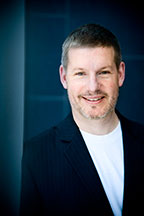
Claudio Calligaris
Patrick Hansen is a man on a musical mission: to build upon Opera McGill’s already stellar reputation by dragging it – if not kicking and screaming, then certainly slapping, punching and fainting – into the 21st century.
“The opera business has changed tremendously over the past decade. It used to be only about what the audience heard, but now it’s as much about what they see,” said Hansen, who took the helm this semester as Director of Opera Studies at McGill’s Schulich School of Music. By marrying the musical and dramatic aspects of opera, or at least rekindling the romance, Hansen expects to help produce a new generation of well-rounded young performers who have not only the skills, but the self-marketing savvy to survive and thrive in the increasingly competitive world of professional opera.
To that end, he is bringing in guest lecturers who will not only speak to the students about how to sing, but how to slap, throw a punch and fall down convincingly onstage; in short, how to act.
“I’m trying to open the students’ eyes to how the opera business actually works nowadays,” Hansen explained. In today’s real world of professional opera, the words “product” and market” are as ubiquitous as “aria” and “soprano.” It’s all about selling yourself.
And Hansen should know. At the age of 43, he brings 25 years of experience, most recently as Director of Artistic Administration for the Florida Grand Opera. He has also held a fellowship in opera coaching at the Juilliard Opera Centre, was director of the Young America Artists Program at the Glimmerglass Opera festival in Cooperstown, N.Y., muisic director of opera and musical theatre at Ithaca College, as well as chorus master and assistant conductor with Tulsa Opera, Opera Memphis and Des Monies Metro Opera.
While at the Florida Grand Opera, he helped set up the Carnival Center for the Performing Arts, a $480-million concert, opera and ballet facility in downtown Miami with the second-largest stage in North America.
"My experience has been varied," he said.
Though his work took him all around the world to find and cast opera singers, and he felt he was becoming “important” in the business, it wasn’t enough for Hansen. “It wasn’t important enough to be important,” he explained. “I missed teaching and I missed creating art. I was being flown to Vienna and Berlin, but I’d rather be in a room with a 20-year-old soprano, helping her sing.”
The decision to do so at McGill was a fairly easy one to make.
"The Wirth Opera Studio is tremendous—any opera company would be jealous of that space," he said.
"And the Faculty here has been really warm and welcoming. They seem ready for someone to come in with fresh ideas. They're not afraid of change, which is great, because I'm changing things."
—Michael Bourguignon

